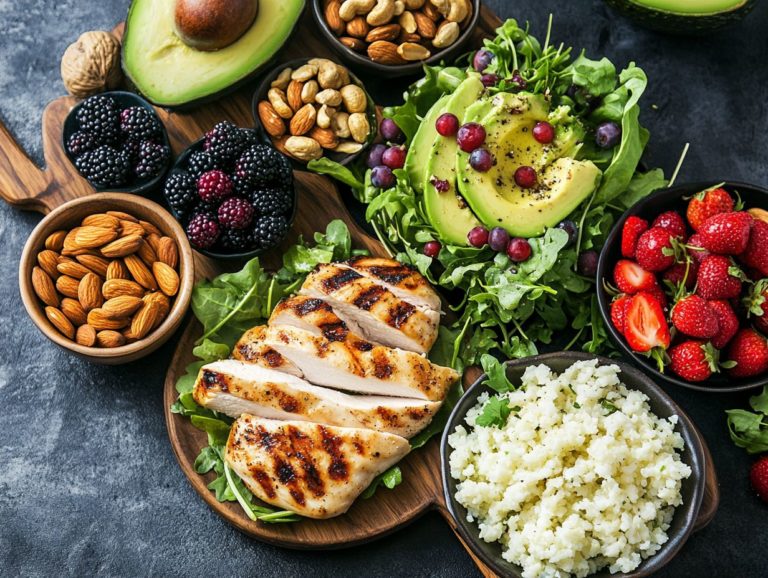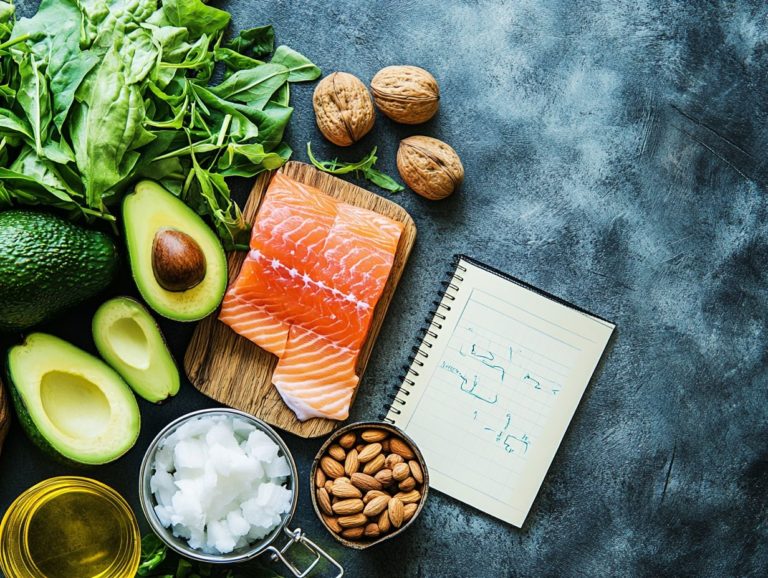Keto Diet: Nutritional Assessments Made Easy
Contents
- The Keto Diet: A Comprehensive Guide
- Key Takeaways:
- What is the Keto Diet?
- How Does the Keto Diet Work?
- What is Ketosis?
- What are Ketones?
- How Does the Keto Diet Affect the Body?
- What are the Health Benefits of the Keto Diet?
- Health Benefits of the Ketogenic Diet
- What Foods Can You Eat on the Keto Diet?
- Foods to Avoid on Your Keto Journey
- 2. Processed Foods
- 3. Sugary Drinks
- Nutritional Balance
- Frequently Asked Questions
- How can I assess my nutritional needs while on a keto diet?
- Are there any potential health risks associated with a keto diet?
- Can I follow a keto diet if I am vegetarian or vegan?
The Keto Diet: A Comprehensive Guide
The Keto Diet, a popular ketogenic diet, has surged in popularity for its distinctive approach to nutrition and weight management. By significantly cutting down on carbohydrate intake and ramping up your intake of healthy fats, this high-fat diet encourages your body to enter a state of ketosis, transforming it into an efficient fat-burning machine.
You will also find helpful dietary guidelines on what to eat and avoid, simplifying your journey through the keto lifestyle.
Key Takeaways:

- The Keto Diet is a low-carb, high-fat diet that aims to put the body in a state of ketosis, where it burns fat for energy instead of carbohydrates. This dietary approach has various ketogenic variations, including the Atkins diet and Paleo diet.
- Key health benefits of the Keto Diet include weight loss, improved blood sugar control, reduced inflammation, and increased energy levels. It also aids in diabetes management and can have positive effects on metabolic syndrome.
- Healthy fats, high-protein foods, low-carb vegetables, and limited amounts of fruit are all essential components of a well-rounded Keto Diet, while high-carb and processed foods should be avoided. This ensures balanced nutrient intake and helps in appetite regulation.
What is the Keto Diet?
The ketogenic diet, commonly called the keto diet, is a low-carb, high-fat dietary strategy crafted to facilitate substantial weight loss and induce metabolic changes in your body. By limiting carbohydrate intake and prioritizing healthy fats alongside moderate protein consumption, this approach ushers you into a state of ketosis.
In this state, your body shifts gears, relying on fat as its primary energy source rather than carbohydrates. With a range of health benefits, the keto diet has become a go-to choice for individuals aiming to manage their weight and enhance their overall well-being especially for those grappling with insulin resistance or chronic health conditions like diabetes and obesity.
Understanding the Macros in the Keto Diet
In the ketogenic diet, the distribution of macronutrients plays a pivotal role in both achieving and maintaining ketosis. Typically, this low-carb dietary strategy involves a macro ratio of around 70-75% dietary fats, 20-25% protein, and a mere 5-10% carbohydrates.
This specific ratio acts as your roadmap, guiding your body into a state where fat becomes the primary fuel source. By prioritizing dietary fats think olive oil, avocados, and nuts you encourage your body to harness ketones, the delightful byproduct of fat metabolism, rather than relying on glucose from carbohydrates.
Meanwhile, incorporating high-quality protein sources such as meats and eggs helps maintain muscle mass and keeps you feeling full. With carbohydrates restricted to modest amounts from low-carb vegetables like leafy greens, you effectively minimize the risk of blood sugar spikes. Such a meal plan ensures a balanced nutrient intake essential for long-term metabolic health.
Such meticulous management of macronutrients not only elevates your energy levels but also sharpens mental clarity, making it an essential strategy for anyone embarking on the keto journey or exploring other ketogenic resources.
How Does the Keto Diet Work?
The keto diet operates by significantly cutting back on carbohydrate consumption and substituting it with dietary fats. This shift prompts your body to enter a metabolic state known as ketosis, where fat takes center stage as the primary source of energy, rather than glucose.
In this state, your liver transforms fatty acids into ketone bodies, which then step in to replace glucose in your body s energy processes. As a result, you effectively decrease your reliance on carbohydrates while also stabilizing your insulin levels. This is crucial for managing chronic illnesses such as diabetes.
Ready to start your keto journey? Consult a nutritionist for personalized advice and support!
What is Ketosis?
Ketosis is a fascinating metabolic state where your body, running low on carbohydrates, starts to break down stored fats into ketone bodies. This effectively switches its primary energy source from glucose to fat. This intricate process unfolds in the liver, where fatty acids undergo a series of changes to become acetoacetate, beta-hydroxybutyrate, and acetone collectively known as ketone bodies.
These compounds not only serve as an efficient energy source for your brain and muscles, but they also highlight the body’s remarkable ability to adapt when carbohydrate availability is low. By significantly cutting back on your carbohydrate intake, you can enter ketosis through dietary strategies like ketogenic diets, which emphasize high fat and moderate protein consumption. This approach can be particularly effective during fasting periods.
This shift in macronutrient balance can transform your health in remarkable ways! You may experience improved insulin sensitivity, enhanced fat loss, and even potential therapeutic benefits for neurological disorders like Alzheimer’s disease and epilepsy. It s no wonder that this dietary method has gained popularity among those seeking weight loss and overall metabolic health.
What are Ketones?
Ketones, also known as ketone bodies, are water-soluble molecules your liver produces when it breaks down fatty acids. They serve as a vital alternative energy source for your body, especially when your carbohydrate intake is low, as you might experience on a ketogenic or low-carb diet.
These fascinating compounds include acetoacetate, beta-hydroxybutyrate, and acetone. Each plays an essential role in providing energy to various tissues, particularly during periods of prolonged fasting or intense exercise. By shifting your body s primary energy source from glucose to fats, ketones can help reduce your reliance on carbohydrates, promoting weight loss and enhancing metabolic efficiency. This shift also plays a role in regulating appetite hormones and reducing food cravings.
Their production ramps up significantly during ketosis, a metabolic state you can achieve through a low-carb, high-fat diet. Research suggests that ketones have neuroprotective properties, potentially offering benefits for conditions such as epilepsy, Alzheimer’s disease, and even certain cancers. This highlights their versatility and importance in managing health effectively. However, ketogenic diets may come with health risks such as nutrient deficiencies and should be followed with medical guidance.
How Does the Keto Diet Affect the Body?
The keto diet profoundly impacts your body by triggering a range of metabolic changes. You may notice improvements in insulin sensitivity, enhanced fat burning, and better-regulated glucose metabolism, all of which can pave the way for significant health benefits like effective weight management and a decreased appetite. Clinical trials have shown that such dietary changes can have long-term effects on overall health.
For many, especially those facing challenges with diabetes or metabolic syndrome, this dietary transition can be particularly life-altering. By promoting a state of ketosis, the diet encourages your body to prioritize fats as its primary energy source instead of carbohydrates, which is essential for maintaining stable blood sugar and blood levels.
However, this dietary approach comes with its own set of risks. You might encounter side effects such as nutritional deficiencies or gastrointestinal discomfort, which could overshadow the initial benefits over time. Additionally, long-term adherence may raise concerns about cardiovascular health due to an increased intake of saturated fats. This underscores the necessity of careful consideration and seeking medical guidance before diving into such a restrictive eating plan.
What are the Health Benefits of the Keto Diet?

The health benefits of the keto diet go far beyond mere weight loss. You ll find it can be instrumental in managing diabetes, reducing inflammation, and boosting your energy levels. This makes it a holistic dietary approach for anyone looking to enhance their overall well-being and take charge of chronic health conditions.
Health Benefits of the Ketogenic Diet
1. Weight Loss
Weight loss stands out as one of the most praised advantages of the ketogenic diet. This diet is known for its remarkable ability to regulate appetite and reduce caloric intake by facilitating ketosis.
In ketosis, your body shifts into fat-burning mode, utilizing fat for fuel instead of carbohydrates. This makes it an effective strategy for combating obesity.
This transformation in energy metabolism doesn t just ramp up fat oxidation; it also impacts crucial appetite hormones like ghrelin and leptin, which regulate hunger and satiety. As you transition into ketosis, you may notice a significant reduction in food cravings, making it easier to stick to low-calorie meal plans.
Sustaining such dietary changes can help prevent weight regain over time. Imagine starting your day with nutrient-dense options like avocado and eggs for breakfast, enjoying grilled chicken with leafy greens for lunch, and savoring salmon alongside asparagus for dinner. These choices can fuel your energy while supporting your fat loss journey.
Incorporating a variety of food groups ensures a balanced meal plan. Ultimately, the secret to lasting success lies in adopting sustainable dietary changes rather than relying on fleeting quick fixes.
Finding a balanced and enjoyable way to eat is vital for maintaining weight loss and enhancing your overall health in the long run. Look for ketogenic resources and nutritional strategies that fit your lifestyle.
2. Improved Blood Sugar Control
Improved blood sugar control is a significant advantage of the ketogenic diet, especially if you re dealing with insulin resistance or diabetes. By reducing carbohydrate consumption, this approach helps stabilize your blood glucose levels.
The ketogenic diet, often considered a low-carb diet, encourages your body to enter a state of ketosis, allowing it to efficiently utilize fat as its primary fuel source instead of glucose. This leads to lower insulin levels, creating a more stable metabolic environment.
Clinical studies reveal that individuals following a keto diet often see not only lower fasting insulin levels but also improved HbA1c outcomes (a measure of long-term blood sugar levels). This makes it a valuable strategy for managing diabetes and addressing insulin resistance.
Patients frequently report increased energy levels and reduced cravings, which further bolster healthier eating habits. Embracing a ketogenic lifestyle, characterized by a high-fat diet and controlled protein intake, can lead to life-changing benefits for anyone grappling with diabetes and its associated metabolic challenges.
3. Reduced Inflammation
The ketogenic diet presents a compelling opportunity for you to reduce inflammation, a significant contributor to many chronic illnesses and health conditions. By shifting your body s metabolism from glucose to fat burning, you can effectively reduce inflammation.
This dietary approach focuses on high-fat, moderate-protein, and very low-carbohydrate consumption, transforming your body s primary energy source. This shift in nutrient intake can significantly impact overall health.
As a result, you might notice a reduction in inflammatory markers such as C-reactive protein (CRP) and interleukin-6 (IL-6). This transformation not only plays a pivotal role in managing conditions like arthritis and heart disease but also promotes a healthier inflammatory response.
Adhering to this diet could lead to enhanced mental clarity, improved energy levels, and potentially lower risks of various metabolic disorders. Embrace the ketogenic lifestyle for a healthier future.
What Foods Can You Eat on the Keto Diet?
The keto diet places a premium on specific food groups that are rich in healthy fats and low in carbohydrates. You can enjoy delicious foods like avocados, olive oil, nuts, and a variety of low-carb vegetables. These foods are crucial in maintaining the state of ketosis and supporting overall health.
This approach not only meets your body s nutritional needs but also helps maintain a state of ketosis, allowing you to enjoy both health benefits and culinary delights.
1. Healthy Fats
Healthy fats are the cornerstone of your ketogenic journey. Focus on including unsaturated fats from sources like avocados and olive oil, along with a judicious amount of saturated fats from animal products. This dietary approach provides essential nutrients while fueling your body with energy.
These fats play a pivotal role in guiding you into a state of ketosis, a metabolic state where the body burns fat for energy instead of carbohydrates. They also support your overall health by enhancing heart function and mitigating inflammation.
For those fully embracing this lifestyle, incorporating omega-3-rich foods, such as fatty fish like salmon and nutrient-dense nuts like walnuts, can significantly bolster your cardiovascular well-being.
To seamlessly integrate these healthy fats into your meals, consider whipping up a creamy avocado salad drizzled with balsamic olive oil or indulge in a rich coconut milk smoothie. Another delightful option is a zucchini noodle dish tossed in pesto crafted from avocado and nuts. These meal ideas help you adhere to the dietary changes necessary for success.
2. Protein Sources

In the ketogenic diet, consume protein sources in moderate amounts, focusing on high-quality options such as meat, eggs, and low-carb dairy products. These choices provide essential amino acids without loading you up on excessive carbohydrates. A balanced protein intake is crucial for maintaining muscle mass and supporting metabolic health.
These protein sources help maintain muscle mass while following a low-carb lifestyle. It s essential to recognize that achieving the right balance is key. Aim for about 20-25% of your daily caloric intake from protein. This moderate intake not only supports muscle preservation but also promotes feelings of satiety, making it easier to resist unnecessary snacking.
Incorporating a variety of protein sources will ensure you receive a well-rounded intake of nutrients, further enhancing the overall health benefits of your ketogenic journey. This approach also helps prevent nutritional deficiencies that might arise from a restricted diet.
Try incorporating these foods into your meals and feel the difference!
4. Increased Energy Levels
You may find that many individuals report a notable increase in energy levels while following the ketogenic diet. This boost can be attributed to the body s transition to fat burning as its primary energy source, resulting in a more stable and sustained energy output throughout the day. This dietary approach influences appetite hormones, leading to better appetite regulation.
This metabolic shift helps reduce the energy crashes commonly tied to high-carb diets. It also enhances overall physical performance. For instance, you might hear about athletes experiencing improvements in endurance and reduced fatigue during high-intensity workouts. It also contributes to better weight management due to the decrease in carbohydrate intake.
A study published in the ‘Journal of Sports Medicine’ highlighted that participants adhering to a ketogenic diet demonstrated improved fat oxidation and sustained energy levels. Personal anecdotes abound, with many individuals noting that once they adapt to ketosis, they feel more alert and focused in their daily activities as well as during workouts. This clearly shows the amazing health benefits that this dietary approach can provide, including potential improvements in glucose metabolism.
3. Low-Carb Vegetables
Low-carb vegetables are a cornerstone of the ketogenic diet, offering essential nutrients and fiber without the burden of carbohydrates.
Think leafy greens, cauliflower, and zucchini these choices are highly recommended for their numerous benefits. They also play a significant role in glucose production and regulation within the body.
Not only do these vegetables contribute to a well-rounded nutritional profile, but they also play a crucial role in maintaining ketosis. Ketosis is the metabolic state where your body burns fat for fuel instead of carbohydrates, which is instrumental for effective weight loss.
By including low-carb options like spinach, broccoli, and bell peppers in your meals, you can whip up delicious, nutrient-dense dishes.
For instance, consider a stir-fry that features zucchini noodles paired with saut ed spinach it’s a delightful, satisfying alternative to traditional pasta. Or try creamy cauliflower mash as a clever substitute for mashed potatoes.
Embrace these vibrant vegetables today! By integrating them into your daily cooking, you’ll elevate the flavor of your meals and support your overall health with vital vitamins and minerals, ensuring your body flourishes on this low-carb journey.
This approach aligns with various ketogenic variations, including the Atkins diet, Paleo diet, South Beach diet, and Dukan diet, which emphasize the benefits of low-carb vegetables.
4. Limited Amounts of Fruit
While the ketogenic diet permits some fruit consumption, choose wisely and stick to low-carb options like berries. These little gems provide vital vitamins and antioxidants without wreaking havoc on your carbohydrate levels.
This helps in maintaining stable blood levels of glucose and ketone bodies. Fruits such as avocados and olives make for exceptional selections, offering healthy fats that perfectly align with keto principles.
They can elevate your meals, adding a delightful creaminess or a savory twist that makes each bite truly satisfying.
Incorporating these options in moderation think a handful of raspberries topped with a dollop of whipped cream or a slice of avocado nestled in a crisp salad curbs your cravings and supports your nutritional aspirations.
Such choices align with ketogenic resources that suggest balanced fruit intake to avoid disrupting ketosis.
By opting for fruits that are lower in sugar, you can indulge in refreshing snacks or desserts. Picture a berry smoothie blended with unsweetened almond milk delicious and fulfilling, all while ensuring you remain within your carbohydrate limits and relish a burst of flavor with health benefits.
This strategy helps in appetite regulation and minimizing food cravings.
Foods to Avoid on Your Keto Journey
It’s essential for you to sidestep specific foods to ensure the success of your ketogenic diet. High-carb foods, processed items, and sugary drinks can significantly disrupt ketosis and undermine your weight loss efforts.
Avoiding these items mitigates health risks and ensures better adherence to dietary guidelines. By being mindful of your choices, you set the stage for achieving your health goals on this journey.
1. High-Carb Foods
On the ketogenic diet, it’s wise to steer clear of high-carb foods like bread, pasta, rice, and sweets. These items can easily lead to an uptick in carbohydrate intake and disrupt your journey into ketosis.
High-carb foods significantly impact blood sugar levels and can lead to weight regain. These common staples tend to sneak into meals and can derail even the most committed keto enthusiast.
It’s essential to understand that indulging in these foods can cause blood sugar levels to spike, making it more difficult to maintain that coveted state of ketosis.
Instead, embrace alternatives that keep you on track, such as:
- Spiralized zucchini
- Cauliflower rice
- Cloud bread
These substitutes not only satisfy your cravings but also adhere to the low-carb principles fundamental to the diet.
By focusing on these options and being mindful of the pitfalls associated with high-carb foods, you can significantly enhance your chances of achieving your weight loss and health goals on your ketogenic journey.
2. Processed Foods
You should steer clear of processed foods on the ketogenic diet, as they are typically loaded with high-carbohydrate content, unhealthy fats, and may contribute to nutritional deficiencies and health risks.
These foods often disrupt the delicate balance required for ketosis and can negatively affect long-term health. Beyond disrupting your nutrient balance, these processed foods often contain artificial additives and preservatives that can undermine your overall well-being.
Many of these options are packed with sweeteners and refined ingredients, which can derail your efforts to achieve and maintain a state of ketosis. This can also negatively impact your glucose metabolism and make weight management more challenging.
Instead, opt for whole foods like lean meats, fresh vegetables, nuts, and healthy fats such as olive oil and avocados. These choices not only deliver essential vitamins and minerals but also support sustained energy levels.
They help in appetite regulation and overall wellness, making them the foundation of a successful ketogenic lifestyle.
3. Sugary Drinks
Sugar-rich drinks, such as soda and fruit juices, pose a significant threat to your ketogenic diet, as they can drastically elevate your carbohydrate intake, leading to unwanted weight gain and various health risks, including insulin resistance and a group of conditions that increase your risk of heart disease and diabetes.
When these high-sugar beverages enter your body, they disrupt the critical state of ketosis, which is essential for your body to burn fat instead of glucose for energy. This disruption can impede your progress and make it more challenging to reach your weight loss goals and manage chronic illnesses like diabetes and obesity.
Excessive consumption of these drinks can also contribute to insulin resistance and other metabolic disorders. If you’re committed to the ketogenic lifestyle, it becomes paramount to prioritize hydration with healthier alternatives like water, herbal teas, or unsweetened sparkling water.
These choices not only keep you hydrated but also align seamlessly with the principles of a low-carb diet, ultimately fostering your overall well-being and promoting a more sustainable approach to health. Make the switch to healthier options today to boost your health!
Nutritional Balance
Frequently Asked Questions

What is a keto diet?
A keto diet is a high-fat diet that is low in carbohydrates and moderate in protein. It forces the body to burn fat for fuel instead of carbohydrates. This state is called ketosis and can lead to weight loss and other health benefits.
What are some common foods to eat on a keto diet?
Foods that are typically allowed on a keto diet include:
- Meats
- Fish
- Eggs
- Avocados
- Low-carb vegetables
- Healthy fats such as olive oil and coconut oil
Incorporating herbs and spices can add flavor without extra carbohydrates. It is important to avoid high-carb foods like grains, sugar, and starchy vegetables.
Can a keto diet be nutritionally balanced?
Yes, a keto diet can be nutritionally balanced if approached correctly. It is important to include a variety of low-carb vegetables, healthy fats, and high-quality protein sources to ensure adequate nutrient intake.
Consulting with a healthcare professional or registered dietitian can also help create a balanced keto meal plan. This is crucial for diabetes management and avoiding potential long-term effects like nutritional deficiencies.
How can I assess my nutritional needs while on a keto diet?
To assess your nutritional needs on a keto diet, track the fats, proteins, and carbs you eat. Aim for a specific ratio that works for your body.
Regularly monitor your vitamin and mineral intake. Consider supplements if needed to ensure adequate nutrient intake.
Utilizing ketogenic resources like apps and health trackers can be very helpful.
Are there any potential health risks associated with a keto diet?
Like any diet, a keto diet has potential health risks. These include:
- Nutrient deficiencies
- Constipation
- Increased risk of kidney stones
Always check with a healthcare professional before starting a keto diet, especially if you have any preexisting health conditions.
Can I follow a keto diet if I am vegetarian or vegan?
Yes, you can follow a keto diet as a vegetarian or vegan, but it requires careful planning. Incorporate plant-based protein sources like tofu, tempeh, and low-carb vegetables into your meals.
Using ketogenic variations of traditional vegetarian or vegan dishes can also help maintain your diet.






